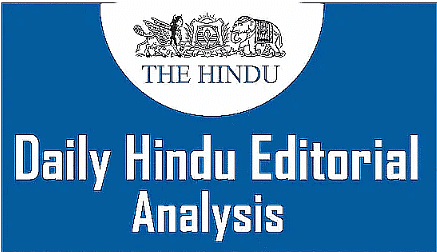UPSC Exam > UPSC Notes > Current Affairs & Hindu Analysis: Daily, Weekly & Monthly > The Hindu Editorial Analysis- 23rd November 2023
The Hindu Editorial Analysis- 23rd November 2023 | Current Affairs & Hindu Analysis: Daily, Weekly & Monthly - UPSC PDF Download

Glimmer of hope
Why in News?
Recently, Hamas, the militant group governing the Gaza Strip, launched a fierce assault on Israel using land, air, and sea forces, resulting in numerous casualties. This has reignited the age-old conflict between Israel and Palestine, prompting the involvement of global and regional powers.
- Israel has forged several peace agreements with neighboring nations like the UAE and Saudi Arabia in recent times, and these alliances are now at risk due to the recent attack.
What is the Israel-Palestine Conflict?
- Balfour Declaration (1917):
- British Foreign Secretary Arthur James Balfour expressed official support for a Jewish "national home" in Palestine.
- Seeds of conflict sown in 1917.
- Creation of Palestine (1948):
- Britain withdrew from Palestine in 1948 due to Arab-Jewish violence.
- United Nations tasked with resolving competing claims.
- UN Partition Plan (1948):
- UN proposed a partition plan for independent Jewish and Arab states.
- Most Arab nations rejected the plan.
- Israel controlled 50% more territory than UN envisioned.
- Arab-Israel War (1948):
- Surrounding Arab states attacked Israel after its declaration of independence.
- Israel gained more territory than UN partition plan.
- Palestinian Liberation Organization (PLO) (1964):
- Formed in 1964 to free Palestine from Israel's control.
- UN granted PLO observer status in 1975.
- Aimed at Palestinian self-determination.
- Six-Day War (1967):
- Israel seized Golan Heights, West Bank, East Jerusalem, Sinai Peninsula, and Gaza Strip.
- Camp David Accords (1978):
- U.S.-brokered "Framework for Peace in the Middle East."
- Set stage for peace talks, but Palestinian issue unresolved.
- Emergence of Hamas (1987):
- Founded in 1987, a violent offshoot of the Muslim Brotherhood.
- Regarded as a terrorist organization by the U.S.
- Won 2006 Palestinian Authority elections.
- First Intifada (1987):
- Tensions in occupied territories led to Palestinian Uprising.
- Small war between Palestinian militants and Israeli army.
- Oslo Accords (1993):
- Israel and PLO recognized each other and renounced violence.
- Established Palestinian Authority with limited autonomy in Gaza Strip and parts of West Bank.
- Gaza Withdrawal (2005):
- Israel unilaterally withdrew Jews from Gaza settlements in 2005.
- Continued control over border crossings (blockade).
- UN Recognition (2012):
- UN upgraded Palestinian representation to "non-member observer state."
- Territorial Disputes:
- West Bank: Controlled by Israel since 1967, with established settlements.
- Gaza: Occupied by Israel in 1967, settlements removed in 2005, but Israel controls access.
- Golan Heights: Captured from Syria in 1967, annexed by Israel in 1981.
- Recent Developments:
- USA officially recognized Jerusalem and Golan Heights as part of Israel.
How has the relationship of India with Israel evolved over the years ?
- India's Position (1947):
- India opposed the UN partition plan in 1947, drawing from its own recent independence experience.
- Recognized Israel in 1950.
- Recognition of Palestinian Entities (1950-1988):
- First non-Arab country to recognize the Palestine Liberation Organisation (PLO) in 1950.
- Early recognition of Palestine's statehood in 1988.
- Dehyphenation of Policy (Recent Times):
- Shift from unequivocal pro-Palestine stance to a nuanced approach.
- Balancing act between longstanding ties with Israel and historical pro-Palestine sentiments.
- India's Changing Position (Recent Years):
- Recent perception of India aligning more with pro-Israel stance.
- Two-State Solution (India's Proposal):
- Supports a Two-State Solution for the Israel-Palestine conflict.
- Advocates the right to self-determination for both nations through peaceful means.
What is the Impact of Assault on Israel-Saudi Arabia Ties ?
- Hamas' Motivation for Assault on Israel:
- Disruption of efforts to bring Saudi Arabia and Israel together is cited as a reason.
- Concerns over threats to Jerusalem’s Al-Aqsa Mosque, the Israeli blockade on Gaza, and regional normalization with Israel.
- Dehyphenation and Muslim Brotherhood Agenda:
- Dehyphenating Saudi Arabia from Israel is seen as promoting the Muslim Brotherhood's agenda.
- Aims to assert territorial sovereignty over the Arab and Middle East region.
- Normalization Impact on Palestinian Territories:
- Normalization of ties with regional powers like UAE, Egypt, and Saudi Arabia may strengthen Israel's position in reclaiming Palestinian territories.
- Ties can drive infrastructural development, creating inter-dependence and relationships, causing concern among Palestinians.
Way Forward
- The world at large needs to come together for a peaceful solution but the reluctance of the Israeli government and other involved parties have aggravated the issue more. Thus a balanced approach would help to maintain favorable relations with Arab countries as well as Israel.
- The recent normalization agreements between Israel and the UAE, Bahrain, Sudan, and Morocco, known as the Abraham Accords, are the steps in the right direction. All regional powers should envisage peace between the two countries on line of Abraham Accords.
- India’s role in multilateral organizations requires “strenuous efforts in cooperation with all related parties to achieve security and stability in the Middle East and West Asia”.
- India is currently serving as a non-permanent member of the United Nations Security Council for 2021-22 and was re-elected to the Human Rights Council for the 2022-24. India should use these multilateral forums to act as a mediator to resolve the Israel-Palestine issue.
The document The Hindu Editorial Analysis- 23rd November 2023 | Current Affairs & Hindu Analysis: Daily, Weekly & Monthly - UPSC is a part of the UPSC Course Current Affairs & Hindu Analysis: Daily, Weekly & Monthly.
All you need of UPSC at this link: UPSC
|
38 videos|5293 docs|1118 tests
|
Related Searches





















